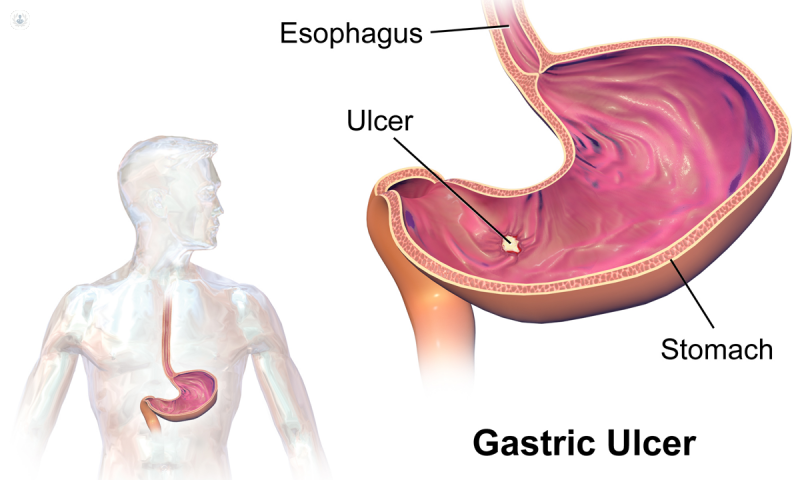Peptic ulcers: your questions answered by an expert
Autore:Peptic ulcers occur in the stomach or duodenum and are caused by an imbalance between the normal stomach acid and the protective barrier called mucin which lines the digestive tract. Stomach ulcers and duodenal ulcers often have no symptoms, but when they do, they can be painful, and if they bleed it can be serious. How much do you know about peptic ulcers? Top gastroenterologist Stuart Bloom answers 6 questions you need to know the answers to!

What are the symptoms of H. pylori/stomach ulcers?
Most ulcers present with symptoms of dyspepsia, or indigestion; a discomfort around the upper abdomen or just underneath the ribs, which may radiate through to the back. This can either be relieved or worsened by food. In serious cases, the ulcers can bleed. If the blood loss is slow, occurring over days or weeks, the blood gets digested and is not seen in the stool, but gradual loss of blood can result in anaemia. If on the other hand the bleeding is rapid the loss of blood from the circulation can cause weakness, dizziness on standing and the blood in the intestine can turn the stools black and tarry. This symptom of black and tarry stool is called melaena and should prompt an immediate visit to the GP or hospital.
How does Helicobacter pylori cause peptic ulcers in humans?
We think most people get infected with Helicobacter pylori in early life. The reason why HP seems to cause problems only after many years is not completely understood. HP causes inflammation in the stomach (gastritis) and this can cause an increase in the acid producing hormone called gastrin. Over time raised levels of acid can cause symptoms of indigestion and eventually damage the lining of the stomach to form an ulcer.

I’ve heard that peptic ulcers need an operation to cure them; is this true?
Surgery for peptic ulcers was until recently very common and many of us will have parents, uncles or aunts who have had operations for stomach or duodenal ulcers. Fortunately, the discovery of Helicobacter and usually effective antibiotic therapy to cure this infection has greatly reduced the need for this type of surgery, which is now very uncommon.
Can peptic ulcers lead to cancer?
Peptic ulcers themselves do not lead to cancer, but some stomach cancers can present as a stomach ulcer. Therefore, it’s important to take biopsies when treating a gastric ulcer to make sure it’s not cancerous and also to check that it has healed after using appropriate therapy.
There is an association between H. pylori infection and stomach cancer, so we will usually give treatment to eradicate HP when we find it.
What are the other causes of peptic ulcers?
Although peptic ulcers usually result from an excess of stomach acid, other factors are often involved. These can include stress, burns, some drugs, such as non-steroidal anti-inflammatories (NSAIDs, including aspirin, voltarol, indomethacin), and some other diseases like Crohn’s or other inflammatory conditions.
What shouldn’t you eat with a stomach ulcer?
There’s no simple diet for patients with a stomach ulcer, but while there is inflammation or ulceration, acidic, spicy or citrus foods will cause a particular discomfort, and probably should be avoided.
You can learn more about gastroenterological conditions here.
If you are showing signs of having a peptic ulcer, you should see your doctor or consult a specialist.


